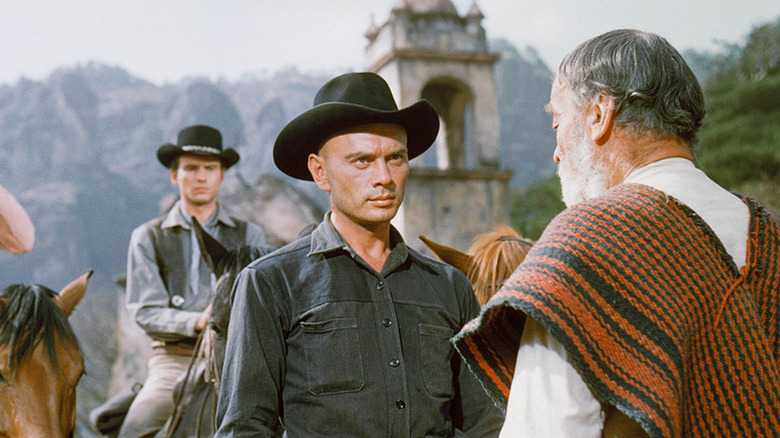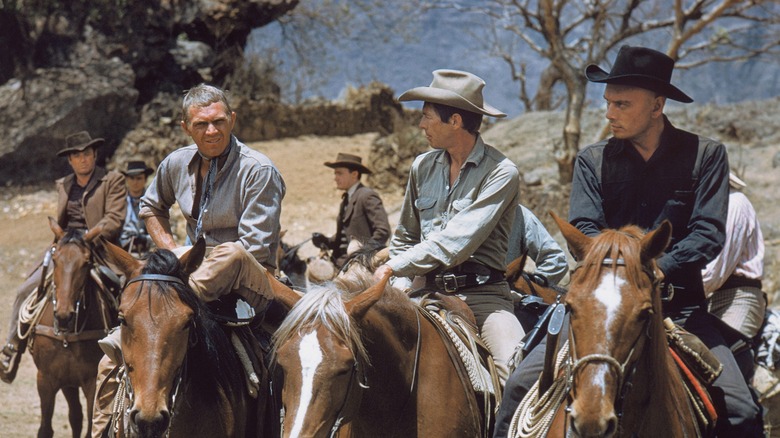The Magnificent Seven Wasn't Working Until It Added That Unforgettable Score
This writer remembers Easter Sunday mornings of childhood when all the candy-filled eggs were collected, sitting before the TV and devouring Cadbury treats as the sweeping fanfare of Cecil B. DeMille's "The Ten Commandments" filled the family room. Charlton Heston and Yul Brynner made big impressions with their booming voices, but what I remembered most was the swell of strings that would arise anytime Yvonne De Carlo's saintly Sephora would grace the screen. Years beyond that childhood, Elmer Bernstein's epic score is what remains in the memory.
Responsible for the oom-pah horns accompanying the "Ghostbusters" on their paranormal escapades and for the militant pomp of Ivan Reitman's "Stripes," Bernstein is as much associated with comedies as the more serious dramas, though you might not know that the guy who scored "The Man With the Golden Gun" is the same who worked on "Animal House." In short, the American composer has too many credits to name.
Among Bernstein's most memorable work is that of John Sturges' 1960 western "The Magnificent Seven," an Old West recalibration of Akira Kurosawa's "Seven Samurai." "Escape Artist, the Life and Films of John Sturges" author Glenn Lovell goes long on "The Magnificent Seven" at CinemaDope, where he quotes Bernstein himself on the "surge of energy" he gave the film:
"If you look at the movie without music ... you'd be surprised how slow-moving it is. I realized immediately that the function of the music would be to get on top of the film, drive it along. It had to have tremendous life and vigor. ... Every once in a while ‒ it doesn't happen often ‒ you hit on something really feel quite thrilling. I remember being very excited when I found that opening rhythm."
The music provides momentum
Those of a certain age bracket might remember the music from Marlboro ads, which used the "Magnificent" theme. Lovell's book characterizes the film's theme music as comparable to John Williams' "Jaws" and "Star Wars" themes as "the most recognizable overture in the history of the medium." As a genre-straddling remake of Akira Kurosawa's "Seven Samurai" epic, "The Magnificent Seven" concerned itself with a group of gunslinger-mercenaries hired by a small Mexican village for protection against a nasty horde of bandits led by Eli Wallach's sleazy Calvera.
The road from Kurosawa's film to Sturges' remake was a long one saddled with rights disputes and in-fighting, but the final result is now recognized as one of the greatest contributions to the western genre. Listen to the theme and see if it doesn't make you want to hit the dusty trail:
Bernstein's symphonic score is filled with rhythmic energy and notes of the resolute American spirit. Mariana Whitmer's companion book "Elmer Bernstein's The Magnificent Seven: A Film Score Guide" quotes him concluding that he learned "in 50 years never to trust a script because the only thing that counts is the movie." For "Seven," Bernstein observed Sturges' strong sense of story and the spectrum of masculinity among his male cast, and responded in kind with valiant symphonic melodies capturing both drama and characterization. He drew upon his experience composing for previous westerns like "Battle of Chief Pontiac" (1952) and "The Tin Star" (1957), creating different music for different characters from the folksy music for the Mexican villagers to Calvera's villain theme. Upgraded by Bernstein's compositions, the success of "The Magnificent Seven" inspired filmmakers to further re-interpret Kurosawa's stories into Westerns — this writer recommends "Yojimbo"-turned-spaghetti Western "A Fistful of Dollars," featuring its own incredible score by Ennio Morricone.

